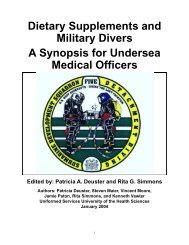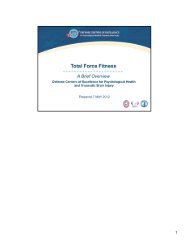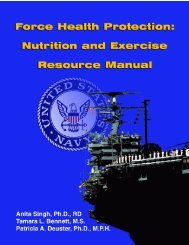Traumatic Brain Injury and Effects of Altitude - Human Performance ...
Traumatic Brain Injury and Effects of Altitude - Human Performance ...
Traumatic Brain Injury and Effects of Altitude - Human Performance ...
Create successful ePaper yourself
Turn your PDF publications into a flip-book with our unique Google optimized e-Paper software.
<strong>Traumatic</strong> <strong>Brain</strong> <strong>Injury</strong> (TBI) <strong>and</strong> <strong>Effects</strong> <strong>of</strong> <strong>Altitude</strong>:An Analysis <strong>of</strong> the Literaturedeployed to high-altitude mission environments such as Afghanistan. It is not clear whether, or how, reexposureto high-altitude settings might affect these individuals’ physical <strong>and</strong> cognitive performance.There is a pressing need for additional research in this area, given previous evidence that persistingeffects <strong>of</strong> even minor head injury may cause subtle but persistent cognitive deficits that can emergeunder mildly hypoxic conditions. Ewing et al. (1980) observed vigilance <strong>and</strong> memory decrements inpreviously concussed (vs. non-concussed) individuals when exposed to simulated high altitude (3800meters). In addition, preliminary data suggests that individuals with disabilities performing as athletes athigh altitude (> 2500 meters) may be more susceptible to AMS, with fatigue <strong>and</strong> weakness being themost common symptoms (Dicianno et al., 2008). The study included military personnel with a variety <strong>of</strong>disabilities, including paraplegia, tetraplegia, multiple sclerosis, <strong>and</strong> TBI. The incidence <strong>of</strong> AMS amongdisabled soldier athletes was not significantly different for those with neurological (vs. non-neurological)disabilities, which raises the concern that prior significant injury in general may be a risk factor for thosewho return to duty at high altitude.ObjectivesThe mission <strong>of</strong> the Defense Centers <strong>of</strong> Excellence (DCoE) for Psychological Health <strong>and</strong> <strong>Traumatic</strong> <strong>Brain</strong><strong>Injury</strong> is to assess, validate, oversee, <strong>and</strong> facilitate the prevention, resilience, identification, treatment,outreach, rehabilitation, <strong>and</strong> reintegration programs for psychological health <strong>and</strong> traumatic brain injuryto ensure the Department <strong>of</strong> Defense meets the needs <strong>of</strong> the nation’s military communities, warriors<strong>and</strong> families. In keeping with these objectives, DCoE requested a review <strong>and</strong> analysis <strong>of</strong> recent researchto inform the care <strong>and</strong> treatment <strong>of</strong> military TBI in high-altitude settings. The overarching intent <strong>of</strong> thisreview is to address the question <strong>of</strong> how altitude-related factors might complicate or confound militaryTBI or its care <strong>and</strong> treatment. Core concerns <strong>of</strong> this analysis are (1) the acute stages <strong>of</strong> care, when theinjured brain is most vulnerable to environmental effects associated with altitude <strong>and</strong> (2) whetherexposure to high altitude may compromise the neurological health or performance <strong>of</strong> those who returnto duty after recovering from TBI.Our analysis was focused to address three component questions:1. How is TBI affected by altitude <strong>and</strong> related/co-occurring changes in oxygenation, intra-cranialpressure (ICP), edema, temperature, blood pressure or fluid balance?2. How can altitude-related effects on the brain inform the transport, care <strong>and</strong> treatment <strong>of</strong> TBI inmilitary settings?3. Do altitude-related effects on TBI vary by injury severity level <strong>and</strong>/or acute vs. chronic injuryphase?To address these questions, we conducted a broad search <strong>of</strong> the medical scientific literature relevant toTBI, altitude-related illness, <strong>and</strong> secondary brain injury. In addition, we also performed a targetedsearch using Google Scholar <strong>and</strong> PubMed to capture clinical studies published in English within a 10-yearperiod from 2000 to April, 2010, inclusive. We used any combination <strong>of</strong> the primary search terms;traumatic brain injury, TBI, mild traumatic brain injury, mTBI, moderate TBI, severe TBI, concussion,repeat concussion, multiple concussion, <strong>and</strong> blast injury in any combination with the secondary searchterms; altitude, high altitude cerebral edema, HACE, brain volume, aeromedical, temperature,September 14, 2010 13


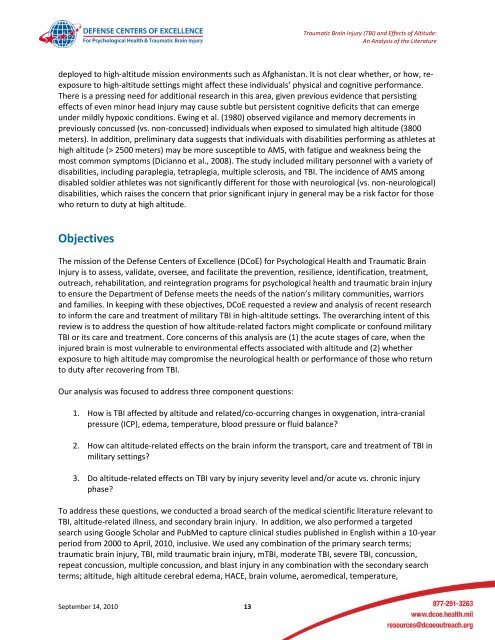
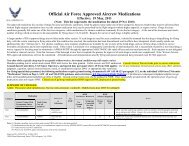
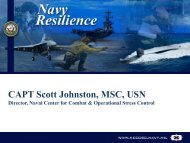
![Body Composition and Military [PDF] - Human Performance ...](https://img.yumpu.com/43269347/1/190x245/body-composition-and-military-pdf-human-performance-.jpg?quality=85)
![Tips for Grocery Shopping [PDF]](https://img.yumpu.com/37447379/1/190x245/tips-for-grocery-shopping-pdf.jpg?quality=85)
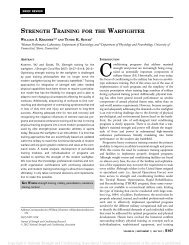
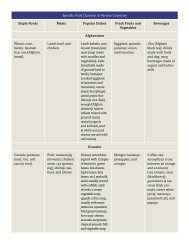
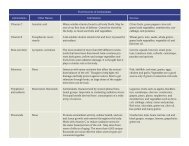
![Synthetic Drugs [PDF] - Human Performance Resource Center](https://img.yumpu.com/37447322/1/190x245/synthetic-drugs-pdf-human-performance-resource-center.jpg?quality=85)
